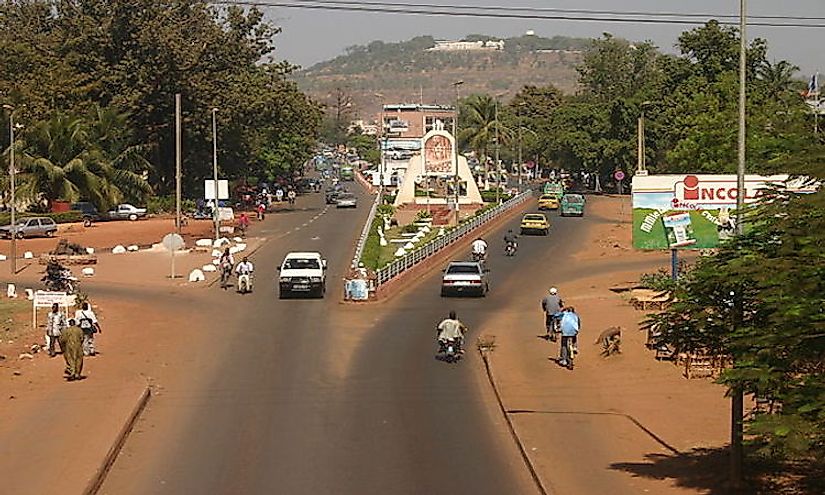Biggest Cities In Mali

Mali, officially the Republic of Mali, is a landlocked country in West Africa. France colonized it in 1905. Bamako is its largest and capital city. It is the 8th largest country in Africa covering an area of 480,000 square miles with a general population of 14.5 million. The country depends on agriculture and fishing as well as some natural resources like gold and salt, but more than half its population live below the international poverty line. The country gained independence from France in 20th June 1960 and became Republic on 22nd September 1960 after it withdrew from the Mali Federation.
The Biggest Cities In Mali
Bamako
Bamako, the capital and largest city in Mali, covers an area of 6,618.4 square miles with a population of 1.8 million. It is located on the Niger River fertile plains which provided people with enough food supply which enabled its faster growth as it grew wealthy through the trading routes established. After its establishment, the early inhabitants traded gold, ivory, kola, nuts, and salt. Initially, the town was located on the northern side of the river, but due to the rapid developments and increase in population, bridges were built to connect both sides of the river. A tropical savannah climate is evidenced here where March to May are the hottest months and July to September are the rainiest
Sikasso
Sikasso is the capital city of the Sikasso region. It is the second largest and most populous city in Mali with an area of 200 square miles and a population of 225,753. It is located 233 miles southeast of Bamako and acts as a passageway between coastal countries and the landlocked (Mali and Burkina Faso). The climate is moderate as rainy season falls between May and September and the hottest March to April. The town is home to several attractions like the large market, Mamelon Hill, remains of Tieba Traore’s Tata and Missirikoro Grotto.
Kalabancoro
Kalabancoro is a city in Koulikoro Region. It is partly considered a suburb of Bamako. The city is located on the southern side of the Niger River and is a rapidly growing commune with a population of 166,722 making it the third most populous city in the country.
Koutiala
Koutiala is a town in the Sikasso region. It was founded in the 16th century by the Coulibaly family of the Segou kingdom. It is located 87 miles north of Sikasso city and has a general population of 137,919. It has been noted as the second most industrial city in the country for its production of cotton though has faced the challenge of stagnation for more than three decades and grain production like millet, sorghum, and maize.
Segou
Segou, a town in Segou region, Segou Cercle, Mali, is located 146 miles northeast side of Bamako on Niger River.it is the fifth largest town in the county with a population of 130,690 and an area of14 square miles. It is characterized by a semi-arid climate with both rainy and dry season, the Niger and Bani river help in irrigation of the town.
Problems Faced By The Urban Population Of Mali
Poverty is a major problem being faced in Mali both in towns and rural areas. Cities are overcrowded as people move from their rural homes in search of job opportunities to sustain the ever high cost of living. The rural-urban migration has made the providence of social amenities a challenge for the government.
The Biggest Cities In Mali
| Rank | Biggest Cities in Mali | Population in Most Recent Census |
|---|---|---|
| 1 | Bamako | 1,809,106 (2,757,234 Metro) |
| 2 | Sikasso | 225,753 |
| 3 | Kalabancoro | 166,722 |
| 4 | Koutiala | 137,919 |
| 5 | Segou | 130,690 |
| 6 | Kayes | 127,368 |
| 7 | Kati | 114,983 |
| 8 | Mopti | 114,296 |
| 9 | Niono | 91,554 |
| 10 | Gao | 86,633 |











